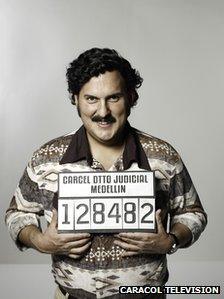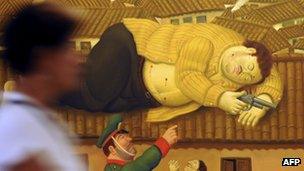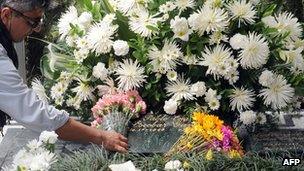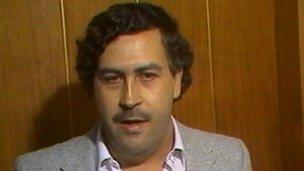Colombian TV drama about drug lord Pablo Escobar a hit
- Published
The trailer for the Colombian soap opera 'Escobar: the Boss of Evil'
He is the drug lord who defined an era, turning the cocaine trade into a multi-million dollar business and killing whoever dared to stand in his way.
Now, more than 18 years after being gunned down on a rooftop in the city of Medellin, everybody in Colombia is once again talking about Pablo Escobar.
The country's biggest television network, Caracol, is currently showing a 63-episode drama series about the life of the boss of the Medellin drug cartel.
The fierce debate about the series, which began even before it started, shows how controversial a figure Escobar remains.

Making a drama of Escobar's life has not met universal approval
Colombian television has dealt with the world of drug trafficking many times before.
But Escobar: The Boss of Evil is not your run-of-the-mill soap opera.
With a cast of some 1,300, and filmed in more than 450 different locations, it is one of Caracol's most ambitious productions.
The series was produced by relatives of two of Escobar's most high-profile victims: Luis Carlos Galan, a presidential candidate who made the fight against drugs the cornerstone of his campaign, and Guillermo Cano, the publisher of the daily newspaper El Espectador.
The producers say their aim was historical accuracy.
The show is also the first to openly use the name of the man who once was the world's biggest drug trafficker and Colombia's public enemy number one.
"It was like something really bad happened within the family and we needed to wait for time to pass before we could address the issue," series director Carlos Moreno told the BBC.
All-out war
Mr Moreno says he wanted the series to be as much about Escobar as his many victims, who included rival drug traffickers, policemen, politicians, and journalists.
Many innocent civilians were also caught up in his war against the Colombian state as he resisted efforts to extradite him to the US.
In the 1980s and early 1990s, Escobar and his cartel turned Medellin into a byword for violence, and the most conservative estimates hold him responsible for some 4,000 deaths.

Renowned Colombian artist Fernando Botero depicted Escobar's demise on a Medellin rooftop
But Escobar was not universally despised.
His memory is still cherished in some of Medellin's poorest neighbourhoods, where he used to build houses and football pitches and was regarded by some as a local Robin Hood.
"There still are people who hate him and people who love him dearly," Andres Parra, the actor who plays Escobar in the series, told the BBC.
"He was a very complex character: a great son, a great husband, a great father, a great friend, who also had the capacity to inflict a great deal of pain and terror.
"He claimed to be a defender of human rights who was also able to order the bombing of a commercial plane."
Must-see TV
For Mr Parra, Escobar's contradictory personality is what makes him such a compelling character to play.
And it can also explain why the first episode of the series, broadcast on 28 May, attracted a record 11 million viewers.

Escobar's grave has become a tourist attraction in Medellin
Many Colombians also seem to have adjusted their routines in order to not miss the programme, which is on every weekday night.
But in a country that is still waging a painful and bloody war against the cocaine trade, not everybody approves of giving a drug lord such top billing.
Colombia has tried hard to overcome the association with drugs and violence it earned during the Escobar era.
There are fears his rags-to-riches story could inspire a new generation of drug traffickers.
Indeed, as a self-made man who made it to Forbes magazine ranking of the world's 10 wealthiest men, Escobar embodied the ambitions and dreams of many poor Colombians.
And, by doing so, he also offered them a rationale to justify the cocaine trade.
"Drug trafficking has been the promise of social change," said Mr Moreno.
Lessons of the past
For the director of The Boss of Evil, that is precisely why it is also important to make sure younger Colombians fully understand the pain caused by the biggest drug lord of them all.
"I know who Escobar was, but what I know about him I know because of my family," Marcela Mendez, a 18-year-old student, told the BBC.

Escobar in his heyday was one of the most feared and powerful men in Colombia
"I was only three years old (when Pablo Escobar died) but those things are never forgotten, because of what our families had to go through, bombs exploded when they were on the streets," said Antonio Pinillos.
"I think in Colombia everybody knows who Escobar was, although I'm not so sure my generation knows all the truth."
Mr Pinillos said he believed Caracol Television's main aim in dramatising such a painful period of the country's recent history was big ratings.
But he also feels the show can help to fill in some gaps.
For director Carlos Moreno, the silence about some parts of the Escobar story is explained by the close ties the drug lord had with many politicians and businessmen.
"And there still are many (uncovered) links: political, economic, social," Mr Moreno said.
That might be why the series has proved so controversial. But it may also be the reason why it was necessary.